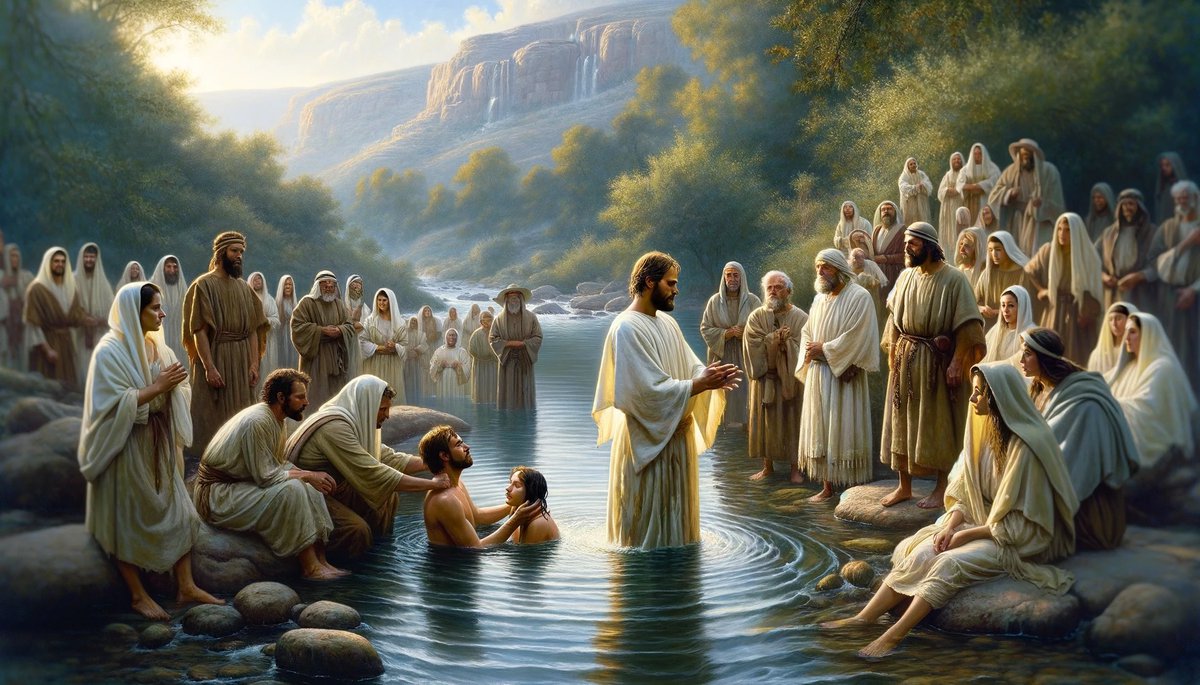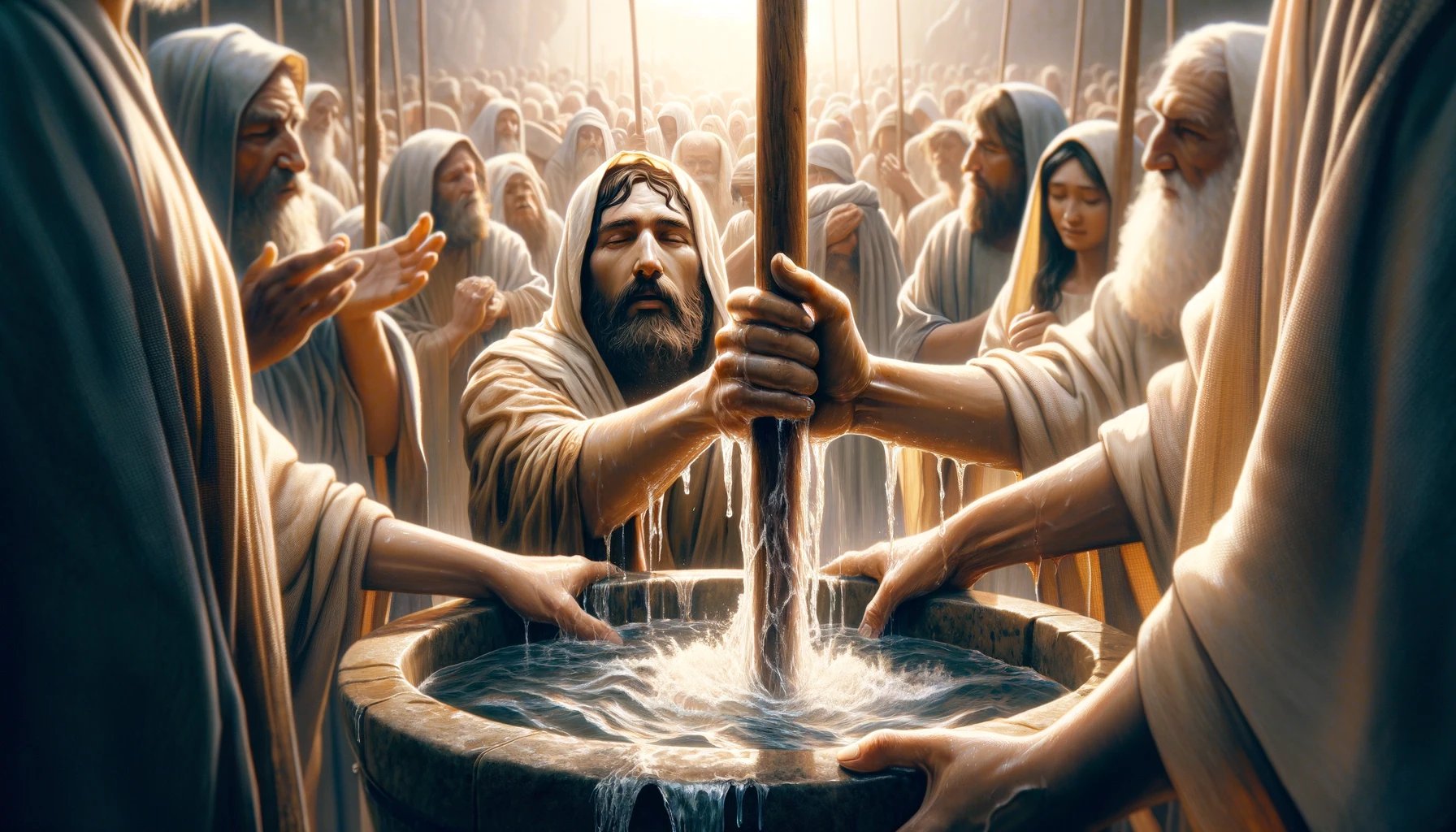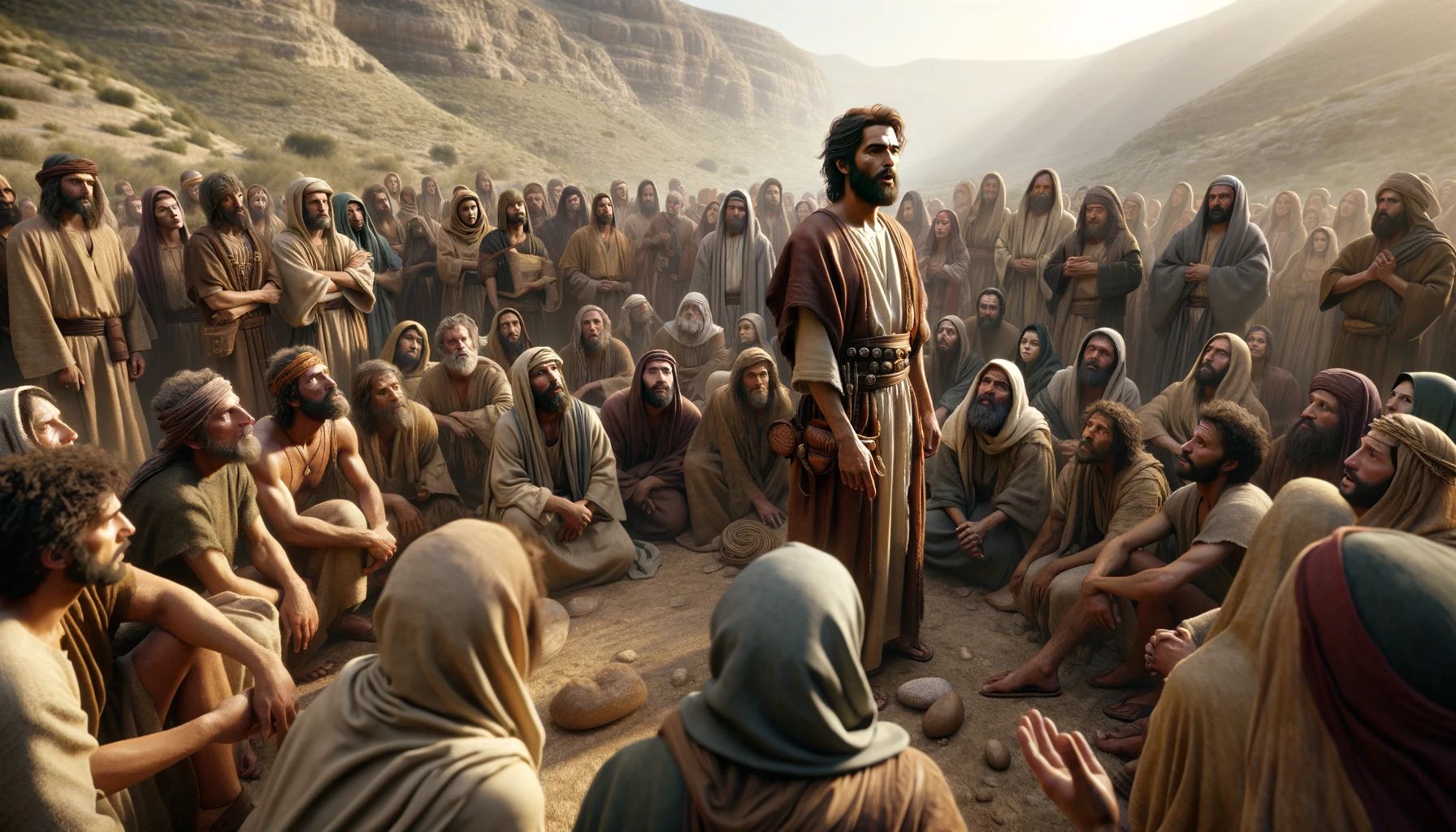Home>Theology and Spirituality>Why Is John The Baptist The Greatest Prophet


Theology and Spirituality
Why Is John The Baptist The Greatest Prophet
Published: February 24, 2024
Peter Smith, Editorial Director at Christian.net, combines deep insights into faith, politics, and culture to lead content creation that resonates widely. Awarded for his contributions to religious discourse, he previously headed a major organization for religious communicators, enhancing dialogue on faith's societal impacts.
Discover why John the Baptist is considered the greatest prophet in theology and spirituality. Explore his significance and impact in religious history.
(Many of the links in this article redirect to a specific reviewed product. Your purchase of these products through affiliate links helps to generate commission for Christian.net, at no extra cost. Learn more)
Table of Contents
Introduction
John the Baptist is a central figure in Christian theology and spirituality, revered for his pivotal role in preparing the way for the ministry of Jesus Christ. His significance extends beyond his historical presence, as he is regarded as the greatest prophet in Christianity. Understanding the reasons behind this esteemed status requires delving into the multifaceted aspects of John the Baptist's life, ministry, and impact on the course of religious history.
As we explore the life and legacy of John the Baptist, we will uncover the profound influence he exerted on the development of Christian beliefs and practices. From his unique birth and upbringing to his powerful message of repentance and baptism, John the Baptist's narrative is intertwined with the foundational principles of faith and spiritual transformation. Moreover, his close connection to Jesus Christ and the manner in which he paved the way for the Messiah's ministry underscores his unparalleled significance in the Christian tradition.
In this comprehensive exploration, we will delve into the pivotal role of John the Baptist in the Bible, examining the prophetic lineage from which he emerged and the fulfillment of ancient prophecies through his existence. We will also delve into the profound impact of his message and ministry, shedding light on the timeless relevance of his call to repentance and the symbolism of baptism as a transformative rite. Furthermore, we will unravel the intricate relationship between John the Baptist and Jesus, elucidating how their intertwined destinies shaped the course of salvation history.
As we embark on this journey through the life and legacy of John the Baptist, we will gain a deeper appreciation for the enduring significance of this enigmatic prophet and the indelible mark he left on the tapestry of spiritual history. Through a nuanced exploration of his contributions, we will uncover the timeless relevance of his message and the enduring impact of his prophetic ministry.
John the Baptist's Role in the Bible
John the Baptist's role in the Bible is profoundly significant, as his life and ministry are intricately woven into the fabric of biblical history. His birth, as foretold by the angel Gabriel to his father Zechariah, marked the fulfillment of ancient prophecies, signaling the dawn of a new era in the divine plan of salvation. The Gospel of Luke portrays John as the fulfillment of the prophecy in Isaiah 40:3, "A voice of one calling in the wilderness, 'Prepare the way for the Lord, make straight paths for him.'" This prophetic connection underscores the divine orchestration of John's mission to prepare the hearts of the people for the imminent arrival of the Messiah.
John the Baptist's significance in the Bible is further underscored by his unique and austere lifestyle. He dwelled in the wilderness, dressed in camel's hair with a leather belt around his waist, and subsisted on a diet of locusts and wild honey. This unconventional way of life served as a powerful symbol of his separation from the trappings of the world and his unwavering commitment to his divine calling. His ascetic lifestyle mirrored that of the prophets of old, evoking the spirit of Elijah and signaling the continuity of the prophetic tradition in preparing the way for the coming of the Lord.
Moreover, John's baptismal ministry, centered on the banks of the Jordan River, held profound symbolic significance. His call to repentance and the act of baptism served as a transformative rite, symbolizing the cleansing of sins and the readiness for spiritual renewal. This ritual immersion in water was not merely a ceremonial act but a profound expression of the inner transformation that John exhorted the people to undergo in preparation for the arrival of the Messiah.
In the Gospel accounts, John the Baptist emerges as a central figure whose role transcends mere historical narration. His presence serves as a bridge between the prophetic promises of the Old Testament and their fulfillment in the person of Jesus Christ. His unwavering commitment to his divine mandate, his fearless proclamation of truth, and his humility in acknowledging the supremacy of the coming Messiah exemplify the quintessential qualities of a faithful servant of God.
In essence, John the Baptist's role in the Bible is foundational to the narrative of redemption and the establishment of the Kingdom of God on earth. His prophetic mission, characterized by unwavering devotion and selfless dedication, set the stage for the unfolding of God's redemptive plan, making him a towering figure in the tapestry of biblical history.
John the Baptist's Message and Ministry
John the Baptist's message and ministry were characterized by a profound call to repentance and a symbolic act of baptism, both of which held immense significance in the spiritual landscape of his time. His message reverberated with urgency, echoing the timeless prophetic call for inner transformation and spiritual renewal. In the wilderness of Judea, John fearlessly proclaimed, "Repent, for the kingdom of heaven has come near" (Matthew 3:2), urging the people to turn away from their sinful ways and prepare their hearts for the imminent arrival of the Messiah.
Central to John's ministry was the ritual of baptism, which he administered to those who heeded his call to repentance. The act of baptism in the Jordan River symbolized a cleansing of sins and a commitment to lead a life in accordance with God's will. It served as a powerful outward expression of an inward spiritual reawakening, signifying a break from the past and a readiness to embrace a new way of living. Through this transformative rite, John emphasized the profound need for a change of heart and a genuine turning toward God.
John's message and ministry resonated deeply with the people of his time, drawing multitudes from Jerusalem, Judea, and the surrounding regions to heed his call. His uncompromising stance on righteousness and his unwavering commitment to truth garnered widespread attention and stirred the hearts of many. His influence extended beyond societal boundaries, reaching individuals from all walks of life, including tax collectors and soldiers who sought his counsel on leading a life pleasing to God.
Furthermore, John's ministry was not confined to mere words and rituals; it embodied a spirit of humility and selflessness. When Jesus approached him to be baptized, John recognized the surpassing nature of the Messiah's divine mission and expressed his unworthiness to perform such an act. His humility in acknowledging the preeminence of Jesus exemplified the depth of his spiritual insight and his profound reverence for the One who was to come.
In essence, John the Baptist's message and ministry encapsulated a timeless call to inner transformation, a resolute commitment to righteousness, and a profound anticipation of the Messiah's redemptive work. His unwavering proclamation of truth and his embodiment of humility continue to inspire and challenge individuals to this day, underscoring the enduring relevance of his message in the pursuit of spiritual awakening and renewal.
John the Baptist's Influence on Jesus
John the Baptist's influence on Jesus transcends mere historical proximity; it encompasses a profound spiritual and theological significance that reverberates throughout the Christian faith. As the forerunner of Jesus, John played a pivotal role in preparing the hearts of the people for the arrival of the Messiah. His ministry of baptism, centered on repentance and spiritual renewal, directly impacted Jesus and set the stage for the inauguration of his public ministry.
The Gospel accounts vividly depict the pivotal moment when Jesus presented himself to John to be baptized in the Jordan River. This profound encounter not only marked the initiation of Jesus' public ministry but also signified a symbolic passing of the baton from the prophetic ministry of John to the redemptive mission of Jesus. The act of baptism, administered by John to Jesus, symbolized a profound identification with humanity's need for spiritual cleansing and foreshadowed the atoning work that Jesus would accomplish through his sacrificial death and resurrection.
Moreover, John's recognition of Jesus as the long-awaited Messiah and his declaration, "Behold, the Lamb of God, who takes away the sin of the world!" (John 1:29), underscored the profound spiritual insight that John possessed. His acknowledgment of Jesus' divine role as the Lamb of God, destined to bring redemption and reconciliation, affirmed the interconnectedness of their respective ministries and the fulfillment of ancient prophecies in the person of Jesus.
Furthermore, John's unwavering commitment to truth and righteousness served as a profound influence on Jesus, shaping his own ministry and teachings. The moral courage and prophetic boldness exhibited by John in confronting the religious authorities and calling for genuine repentance left an indelible imprint on Jesus' own confrontations with the religious establishment and his impassioned calls for inner transformation.
In essence, John the Baptist's influence on Jesus transcends the temporal realm, permeating the spiritual landscape with profound implications for the unfolding of God's redemptive plan. His role as the herald of the Messiah and the preparer of hearts for the coming of Christ underscores the seamless continuity between the prophetic ministry of John and the salvific mission of Jesus. This interconnectedness serves as a testament to the divine orchestration of history and the profound impact of individuals who wholeheartedly dedicate themselves to the fulfillment of God's purposes.
John the Baptist's Impact on History
John the Baptist's impact on history transcends the boundaries of time and space, leaving an indelible imprint on the course of religious, social, and spiritual development. His pivotal role as the forerunner of Jesus Christ and his unwavering commitment to truth and righteousness reverberate through the annals of history, shaping the trajectory of human spirituality and redemptive narratives.
One of the most profound aspects of John the Baptist's impact on history lies in his role as the herald of the Messiah. His proclamation of the imminent arrival of the long-awaited Savior stirred the hearts of countless individuals, igniting a fervent anticipation for the fulfillment of ancient prophecies. The resonance of his message echoed far beyond the confines of his immediate milieu, permeating the collective consciousness of generations to come and laying the groundwork for the advent of Christianity.
Furthermore, John's baptismal ministry and call to repentance engendered a transformative movement that transcended the boundaries of his era. The symbolism inherent in the act of baptism as a rite of spiritual purification and renewal resonated deeply with those who sought a deeper connection with the divine. This profound emphasis on inner transformation and the readiness for spiritual renewal left an enduring legacy, permeating the fabric of Christian sacramental practices and underscoring the timeless relevance of John's message.
Moreover, John the Baptist's moral courage and prophetic boldness in confronting the religious authorities of his time set a precedent for fearlessly speaking truth to power. His unwavering commitment to righteousness and his uncompromising stance on ethical principles served as a beacon of inspiration for future generations, emboldening individuals to stand firm in their convictions and advocate for justice and righteousness.
In the annals of history, John the Baptist emerges as a towering figure whose influence transcends the confines of a specific epoch. His enduring impact on the development of Christian theology, the evolution of spiritual practices, and the collective consciousness of humanity underscores the profound significance of his life and ministry. The echoes of his proclamation, the symbolism of his baptismal ministry, and the moral courage he exemplified continue to reverberate through the corridors of time, shaping the spiritual landscape and perpetuating the enduring legacy of the greatest prophet, John the Baptist.
Read more: Why Was John The Baptist Named John
Conclusion
In conclusion, the enigmatic figure of John the Baptist stands as a towering symbol of unwavering devotion, prophetic insight, and profound spiritual influence. His role as the forerunner of Jesus Christ, the greatest prophet in Christianity, transcends mere historical narration, weaving a tapestry of divine orchestration and redemptive significance. From his unique birth and upbringing to his austere lifestyle and unwavering commitment to truth, John the Baptist epitomizes the quintessential qualities of a faithful servant of God.
The profound impact of John the Baptist's message and ministry reverberates through the corridors of time, resonating with timeless urgency and relevance. His call to repentance and the transformative act of baptism symbolize a universal invitation to inner transformation and spiritual renewal, transcending temporal and cultural boundaries. The enduring legacy of his proclamation continues to echo through the annals of history, perpetuating the timeless relevance of his message in the pursuit of spiritual awakening and renewal.
Moreover, John the Baptist's influence on Jesus Christ underscores the seamless continuity between their respective ministries, affirming the interconnectedness of their divine missions. His pivotal role in preparing the hearts of the people for the arrival of the Messiah and his unwavering commitment to truth left an indelible imprint on the redemptive narrative, shaping the trajectory of human spirituality and the unfolding of God's salvific plan.
As we reflect on the profound impact of John the Baptist on history, we recognize the enduring significance of his life and ministry. His unwavering commitment to righteousness, his moral courage in confronting the religious authorities, and his embodiment of humility serve as timeless exemplars for individuals across generations. The echoes of his proclamation, the symbolism of his baptismal ministry, and the moral courage he exemplified continue to reverberate through the corridors of time, shaping the spiritual landscape and perpetuating the enduring legacy of the greatest prophet, John the Baptist.














